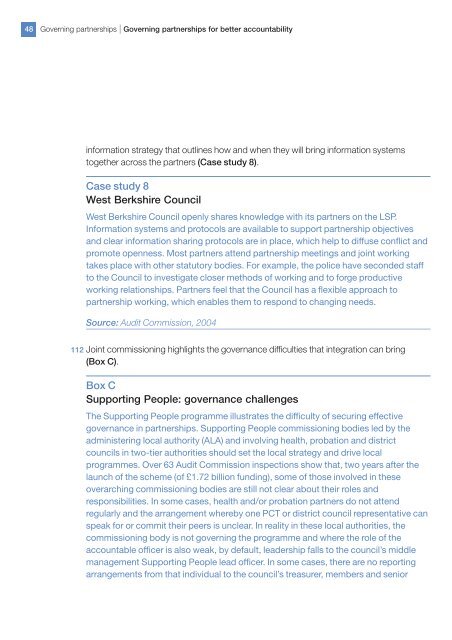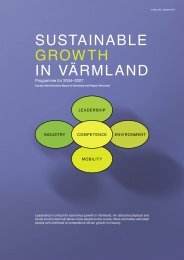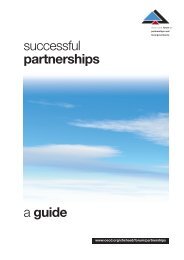Bridging the accountability gap - Audit Commission
Bridging the accountability gap - Audit Commission
Bridging the accountability gap - Audit Commission
You also want an ePaper? Increase the reach of your titles
YUMPU automatically turns print PDFs into web optimized ePapers that Google loves.
48<br />
Governing partnerships | Governing partnerships for better <strong>accountability</strong><br />
information strategy that outlines how and when <strong>the</strong>y will bring information systems<br />
toge<strong>the</strong>r across <strong>the</strong> partners (Case study 8).<br />
Case study 8<br />
West Berkshire Council<br />
West Berkshire Council openly shares knowledge with its partners on <strong>the</strong> LSP.<br />
Information systems and protocols are available to support partnership objectives<br />
and clear information sharing protocols are in place, which help to diffuse conflict and<br />
promote openness. Most partners attend partnership meetings and joint working<br />
takes place with o<strong>the</strong>r statutory bodies. For example, <strong>the</strong> police have seconded staff<br />
to <strong>the</strong> Council to investigate closer methods of working and to forge productive<br />
working relationships. Partners feel that <strong>the</strong> Council has a flexible approach to<br />
partnership working, which enables <strong>the</strong>m to respond to changing needs.<br />
Source: <strong>Audit</strong> <strong>Commission</strong>, 2004<br />
112 Joint commissioning highlights <strong>the</strong> governance difficulties that integration can bring<br />
(Box C).<br />
Box C<br />
Supporting People: governance challenges<br />
The Supporting People programme illustrates <strong>the</strong> difficulty of securing effective<br />
governance in partnerships. Supporting People commissioning bodies led by <strong>the</strong><br />
administering local authority (ALA) and involving health, probation and district<br />
councils in two-tier authorities should set <strong>the</strong> local strategy and drive local<br />
programmes. Over 63 <strong>Audit</strong> <strong>Commission</strong> inspections show that, two years after <strong>the</strong><br />
launch of <strong>the</strong> scheme (of £1.72 billion funding), some of those involved in <strong>the</strong>se<br />
overarching commissioning bodies are still not clear about <strong>the</strong>ir roles and<br />
responsibilities. In some cases, health and/or probation partners do not attend<br />
regularly and <strong>the</strong> arrangement whereby one PCT or district council representative can<br />
speak for or commit <strong>the</strong>ir peers is unclear. In reality in <strong>the</strong>se local authorities, <strong>the</strong><br />
commissioning body is not governing <strong>the</strong> programme and where <strong>the</strong> role of <strong>the</strong><br />
accountable officer is also weak, by default, leadership falls to <strong>the</strong> council’s middle<br />
management Supporting People lead officer. In some cases, <strong>the</strong>re are no reporting<br />
arrangements from that individual to <strong>the</strong> council’s treasurer, members and senior








